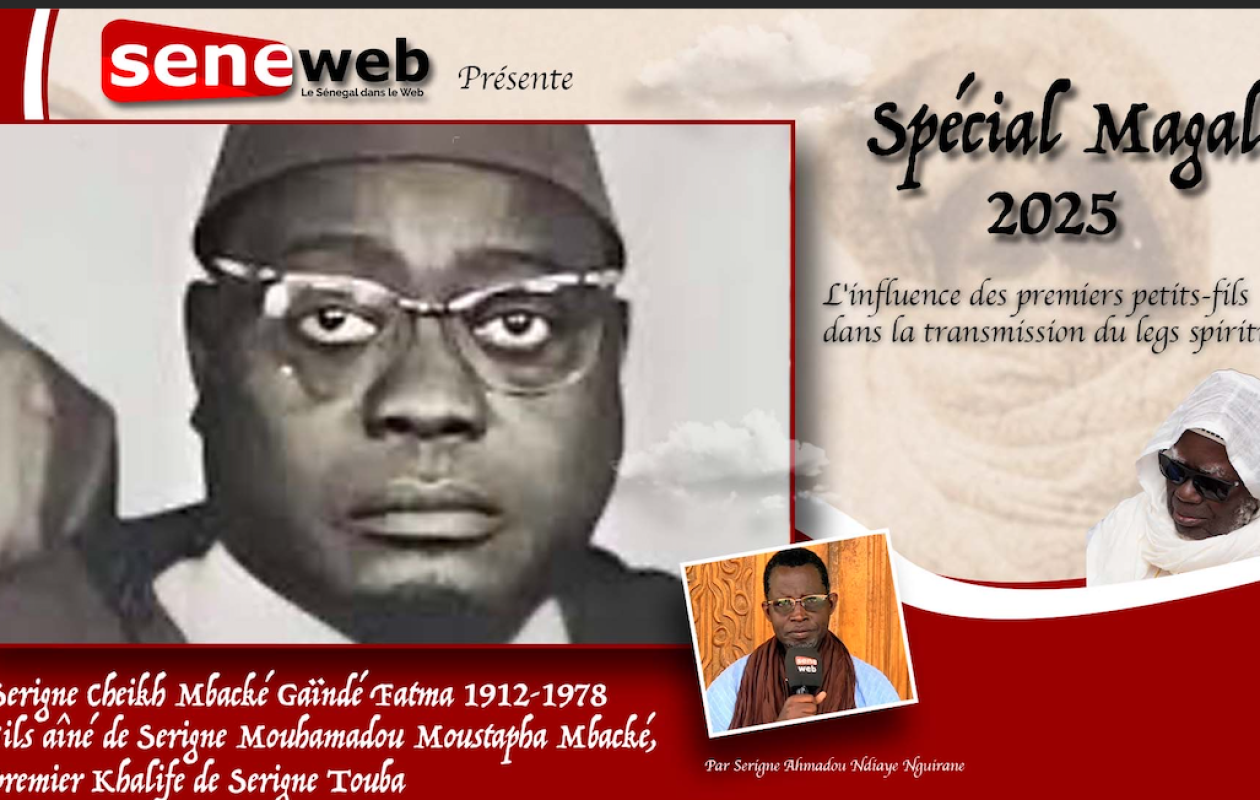
[Portrait] Serigne Cheikh Mbacké Gaïndé Fatma : Un leader religieux influent, parrain du pluralisme politique
In the vast project of founding Mouridism, Sheikh Ahmadou Bamba (the founder), his disciples and his brothers in blood and ideology succeeded, in a hostile colonial context, in laying the foundations of a growing city-state (Touba) backed by a deeply rooted Sufi religious doctrine. A rich heritage jealously preserved by his sons and perpetuated by his grandsons who played an active role in the influence of Mouridism.
Among these spiritual heirs is Serigne Cheikh Ahmadou Mbacké Gaïndé Fatma. The first grandson of Cheikh Ahmadou Bamba, he is an emblematic figure of the brotherhood. Born in December 1912, the eldest son of Serigne Mouhamadou Moustapha Mbacké (first caliph of the brotherhood) and Sokhna Fatma Diop, did not have the privilege of occupying the Khalifat but his influence transcends religious circles to extend to the political, economic, social and even diplomatic spheres.
An openness to the world and to other cultures that in no way altered his spirituality. Like all those who grew up in Khadimou Rassoul's entourage, Serigne Cheikh Mbacké Gaïndé Fatma benefited from a rigorous and rich spiritual and intellectual training. He naturally learned the Quran and Islamic sciences, which formed the basis of his religious formation. During this long journey of learning, he stayed in Tindody from 1919 to 1926, with his younger brother Serigne Mbacké Madina, at the home of Serigne Makhtar Allé Lô.
The two brothers were then sent to Mauritania in 1930 to learn literature, theology, and Tajik. They stayed there for two years before returning to Senegal, specifically to Diourbel, with Serigne Mouhamadou Dème. In 1933, they were entrusted to Serigne Habibou Mbacké al Imam.
However, what sets him apart is his open-mindedness and willingness to explore other fields of knowledge. Serigne Cheikh Mbacké Gaïndé Fatma is considered a visionary religious leader, as he understood early on the importance of education and knowledge in the development of a society. He thus expanded his knowledge into other social sciences, such as philosophy, sociology, and economics, which allowed him to better understand the challenges and opportunities of his time.
Decisive support for the creation of the PDS
Serigne Cheikh Mbacké Gaïndé Fatma is particularly known for having supported the creation of the Senegalese Democratic Party (PDS) of Abdoulaye Wade, President of Senegal (2000-2012). According to concordant sources, he played a key role in financing the first PDS congress held in Kaolack in 1974. "My father Gaïndé Fatma gave 35 million CFA francs to Wade to create the PDS," confided his son Serigne Moustapha Mbacké, a declared candidate in the 2012 presidential election. This support put an end to the single-party system.
The former caliph of Darou Khoudoss, the godfather of political pluralism in Senegal, died in 1978 but continues to inspire generations. Serigne Ahmadou Ndiaye Nguirane traces the career of this visionary religious leader.
Commentaires (1)
Serigne Cheikh Ahmadou MBACKE Gaîndé Fatma ( Sokhna Fatma est sa mère) n'est pas le premier petit-fils de Cheikh Ahmad Bamba. C'est Cheikh Ahmadou Hafiz ( plus connu sous le nom de Serigne Modou Bara, ou encore Gaïndé Bara) fils-aîné de Cheikh Mohammadou Lamine MBACKE ( Serigne Bara ). Serigne Bara est le petit-frère de Serigne Moustapha père de Gaïndé Fatma, Sokhna Aminata LO est leur mére. Serigne Modou Bara a disparu en 1952.
Participer à la Discussion